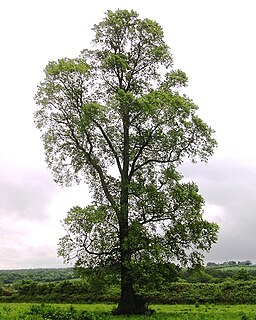
Elms are deciduous and semi-deciduous trees comprising the flowering plant genus Ulmus in the plant family Ulmaceae. The genus first appeared in the Miocene geological period about 20 million years ago, originating in what is now central Asia. These trees flourished and spread over most of the Northern Hemisphere, inhabiting the temperate and tropical-montane regions of North America and Eurasia, presently ranging southward in the Middle East to Lebanon, and Israel, and across the Equator in the Far East into Indonesia.
Panonychus ulmi, the European red mite, is a species of mite which is a major agricultural pest of fruit trees. It has a high reproductive rate, a short generation time and produces many broods in a year, all of which contribute to its pest status. It has a cosmopolitan distribution, and a very wide host range, having been found on the following plants:
Agromyces is a genus in the phylum Actinomycetota (Bacteria).
Xylanimonas ulmi is a Gram-positive, aerobic, rod-shaped and non-motile bacterium from the genus Xylanimonas which has been isolated from decayed wood of the tree Ulmus nigra in Salamanca, Spain.
Xylanimonas cellulosilytica is a Gram-positive, xylanolytic, aerobic, coccoid and non-motile bacterium from the genus of Xylanimonas which has been isolated from a decayed tree in Salamanca in Spain. Xylanimonas cellulosilytica has the ability to hydrolyze cellulose and xylan.
Microbacterium ulmi is a Gram-positive, aerobic, xylanolytic, rod-shaped and non-motile bacterium from the genus of Microbacterium which has been isolated from sawdust from the tree Ulmus nigra in Salamanca in Spain.
Caldicoprobacter is a genus of bacteria from the family of Caldicoprobacteraceae.
Caldicoprobacter oshimai is a Gram-positive, extremely thermophilic, anaerobic, xylanolytic and non-motile bacterium from the genus of Caldicoprobacter which has been isolated from faeces of sheep from the farm at the University of Georgia in the United States.
Agromyces flavus is a Gram-negative, aerobic and non-motile bacterium from the genus of Agromyces which has been isolated from soil from the Tibetan Plateau in China.
Agromyces atrinae is a Gram-positive, aerobic and non-motile bacterium from the genus of Agromyces which has been isolated from fermented seafood from Korea.
Agromyces aurantiacus is a bacterium from the genus of Agromyces which has been isolated from primeval forest soil from Xishuangbanna in China.
Agromyces bauzanensis is a Gram-negative and aerobic bacterium from the genus of Agromyces which has been isolated from hydrocarbon-contaminated soil from Bozen in Italy.
Agromyces binzhouensis is a Gram-positive, heterotrophic, non-spore-forming and rod-shaped bacterium from the genus of Agromyces which has been isolated from soil from the Yellow River delta from Binzhou in China.
Agromyces humatus is a Gram-positive, aerobic and non-motile bacterium from the genus of Agromyces which has been isolated from a wall of a tomb from the Catacombs of Domitilla in Italy.
Agromyces iriomotensis is a Gram-negative bacterium from the genus of Agromyces which has been isolated from soil from a pineapple field from Okinawa in Japan.
Agromyces neolithicus is a Gram-negative bacterium from the genus of Agromyces which has been isolated from soil from the Porto Badisco in Italy.
Agromyces soli is a Gram-negative and non-motile bacterium from the genus of Agromyces which has been isolated from farm soil from Korea.
Agromyces subbeticus is a bacterium from the genus of Agromyces which has been isolated from cyanobacterial biofilm from the Cueva de los Murciélagos in Zuheros from Spain.
Agromyces terreus is a Gram-positive and non-motile bacterium from the genus of Agromyces which has been isolated from soil from Dokdo in Korea.
Agromyces tropicus is a bacterium from the genus of Agromyces which has been isolated from soil from the Chiang Mai Province in Thailand.
